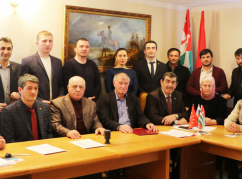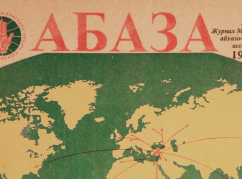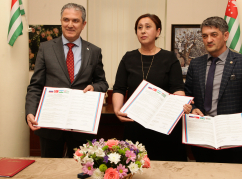The WAC web information portal talked with Vladimir Pshenokov, Head of the Regional Council of the Congress in Kabardino-Balkaria, about the main areas of work in the KBR, about the activities of the cultural center “Abaza” and the tasks of preserving the ethnicity.
Representative of the “Alashara” Autonomous Non-Profit Organization in Kabardino-Balkaria, Assistant Minister for the Repatriation of Abkhazia, Head of the WAC Regional Council in the KBR, Head of the Center for the Study of Culture and History of the Caucasian Peoples “Abaza” Vladimir Pshenokov spoke about the work of the Cultural Center, about the activities of the WAC in the KBR, as well as the tasks of repatriating representatives of the Abkhaz-Abaza and Ubykh Diaspora to their homeland.
- Tell us, please, how the “Abaza” Center for the Study of Culture and History of the Caucasian Peoples was created.
- In Kabardino-Balkaria, it is impossible not to notice the substantial Abkhaz-Abaza component of the history and culture of the Republic, here you understand that the Adyg-Abkhaz world has one common ancestor. This world remains closely intertwined up to today, despite objective historical events and geographical obstacles. The study of [our] history, culture makes it possible to understand what is of paramount importance for our ethnic group at the present stage. [This understanding], in turn, leads to the need to develop ourselves and develop certain civilian mechanisms. Through culture, [today], one can creatively resist the negative side of globalization, and its good (globalization - ed.) side can enrich and multiply the best of those preserved in the nation and society.
Perhaps this is how we, with like-minded people, came to a single decision - to unite around the study of the culture and history of the peoples of the Caucasus. In this endeavor, I was supported by colleagues from the Russian Geographical Society, colleagues from the WAC and, of course, representatives of the Abaza Diaspora in the KBR.
- What are the main tasks of the Center, what is its activity?
- One of the main tasks is the preservation of the historical, spiritual, material and cultural heritage of the peoples of the Caucasus. In this context, we are working to restore and preserve the tangible and intangible cultural heritage of the Abkhaz, Abaza and Ubykhs, and we are assisting the development of related educational and scientific activities. In particular, we are currently developing various forms of distance learning in the history and culture of these peoples. We take an active part in regional and international festivals, parades, contests, exhibitions of an ethno-cultural nature. We organize all kinds of events, we support folk dance groups, and we assist young scientists. In short, we set many tasks for ourselves, but all of them are united by the main idea - the preservation and popularization of the authenticity of Abkhaz, Abaza and Ubykhs.
- A question to you as a member of the Supreme Council of the WAC: what, in your opinion, should the Congress undertake to strengthen the ethnocultural unity of the Abkhaz-Abaza and Ubykh peoples?
- It is important to work actively to create the necessary conditions for the return of representatives of the Abkhaz-Abaza and Ubykh Diaspora to their historic homeland in Abkhazia. We also should not stay away from what is happening in the homeland, should take part in the economic, social and cultural development of Abkhazia, assist the socio-economic and cultural development of the Abkhaz-Abaza and Ubykh peoples.
- How exactly can the Congress facilitate the repatriation of representatives of the Abkhaz-Abaza and Ubykh people to Abkhazia?
- Executing the covenants of our worthy ancestors, putting persistence in upholding the interests of the ethnos in front of the whole world community. [In general,] to unite the ethnos, it is necessary to use all the resources, both of our Diaspora from around the world, and the Republic of Abkhazia.
We do not need to spend time inventing the wheel. The Constitution of Abkhazia explains the situation of compatriots scattered throughout the world, it clearly states the relationship between the state and repatriates, rights and obligations. The Ministry for Repatriation of Abkhazia - by the way, the brainchild of [the first president of Abkhazia], Vladislav Ardzinba - has all the levers for solving problems related to repatriation. The WAC today is a new team with good potential, acting on the basis of the charter, modified to meet international standards. It remains to examine the entire 25-year post-war (after the Georgian-Abkhaz war of 1992-1993 - ed.) period of the development of the Republic of Abkhazia, to work on the mistakes and take a decisive step towards creation. To properly guide the people of Abkhazia, the Ministry of Repatriation, the WAC and work for the good of the people of Apsny (Abkhazia - ed.).
- You head the regional council of the WAC in the KBR. How many members have entered the Congress today, how is the educational work being conducted on the activities of the WAC in your region?
- To date, from the Kabardino-Balkarian Regional Council, about 30 people have joined the WAC. Of course, this is only the beginning, and we are actively working. Unfortunately, we faced a number of problems, the solution of which takes a lot of time, but it is important to note that all these issues are solvable. We are working to attract new members to the WAC in various areas. For example, educational work is being conducted in social networks.
- What are the priority activities of the Congress among the Abkhaz-Abaza-Ubykh Diaspora of Kabardino-Balkaria?
- The priority directions for us are the restoration and strengthening of kinship ties, the expansion and strengthening of ties between the Abkhaz-Abaza and Ubykh Diasporas with their historic homeland. We in every possible way promote the establishment of contacts between Abkhaz, Abaza and Ubykhs living in different countries, strengthening their unity and ethnic identity. And, of course, we are actively working in the development and preservation of the native language.
- What today, in your opinion, is the guarantor of the preservation and development of the Abkhaz-Abaza and Ubykh ethnic groups in the world?
- The will of the representatives of our entire ethnic group. In addition, the will of the leadership of the Republic of Abkhazia and, of course, strict compliance with the Constitution of Abkhazia.



to login or register.